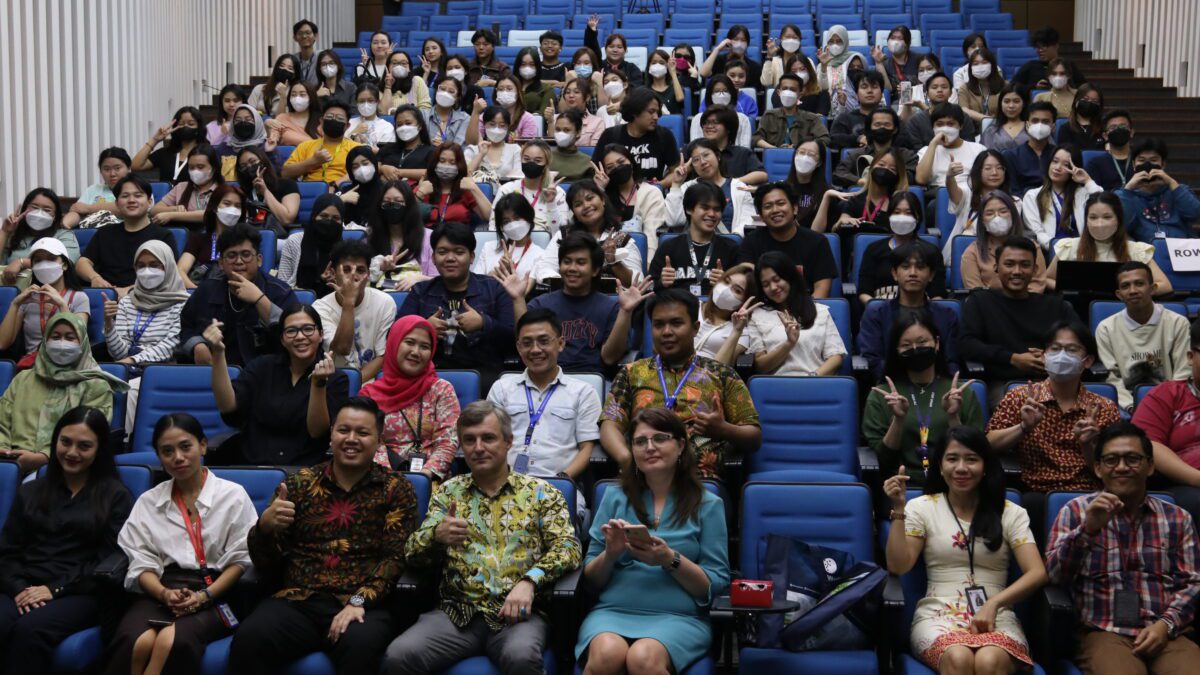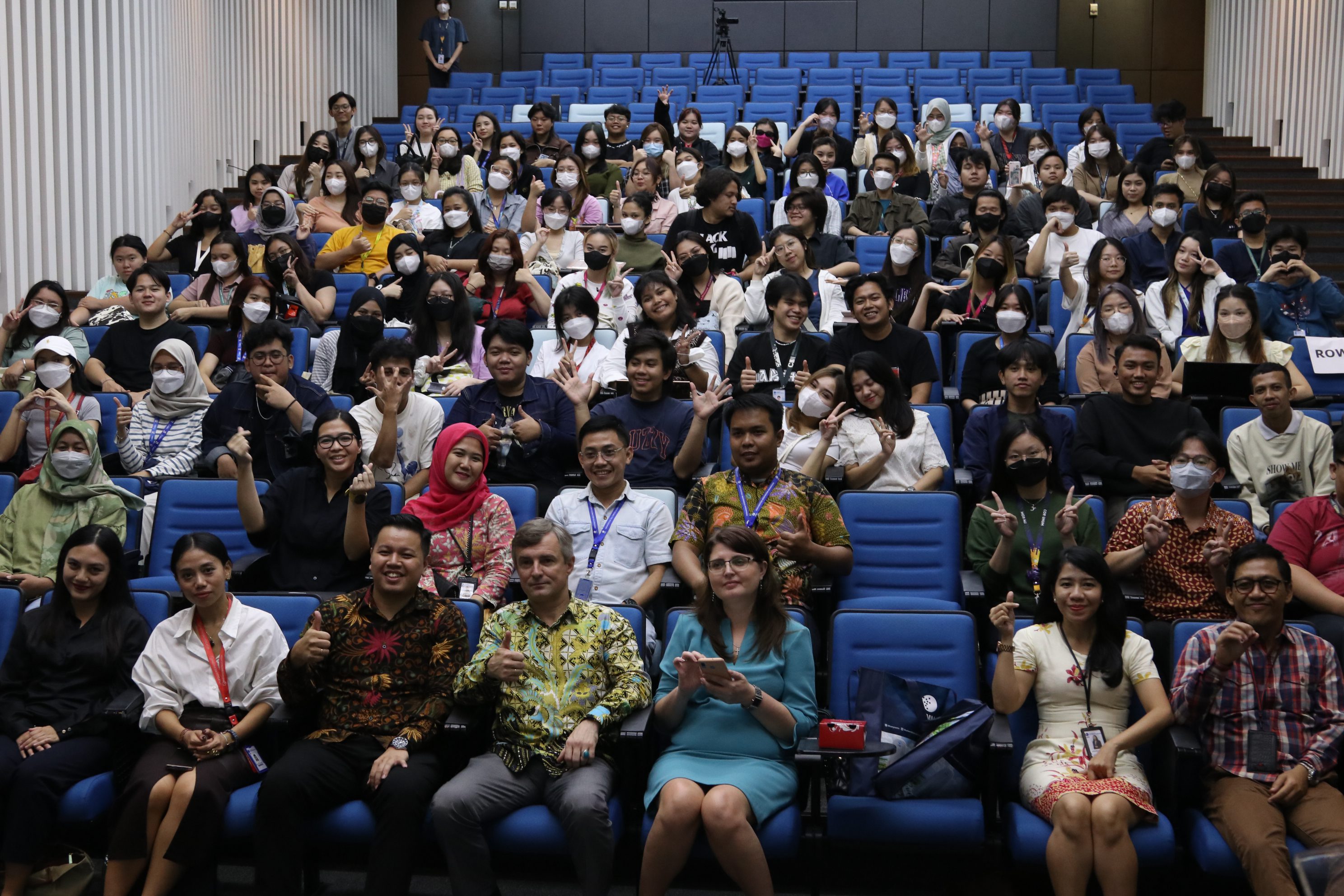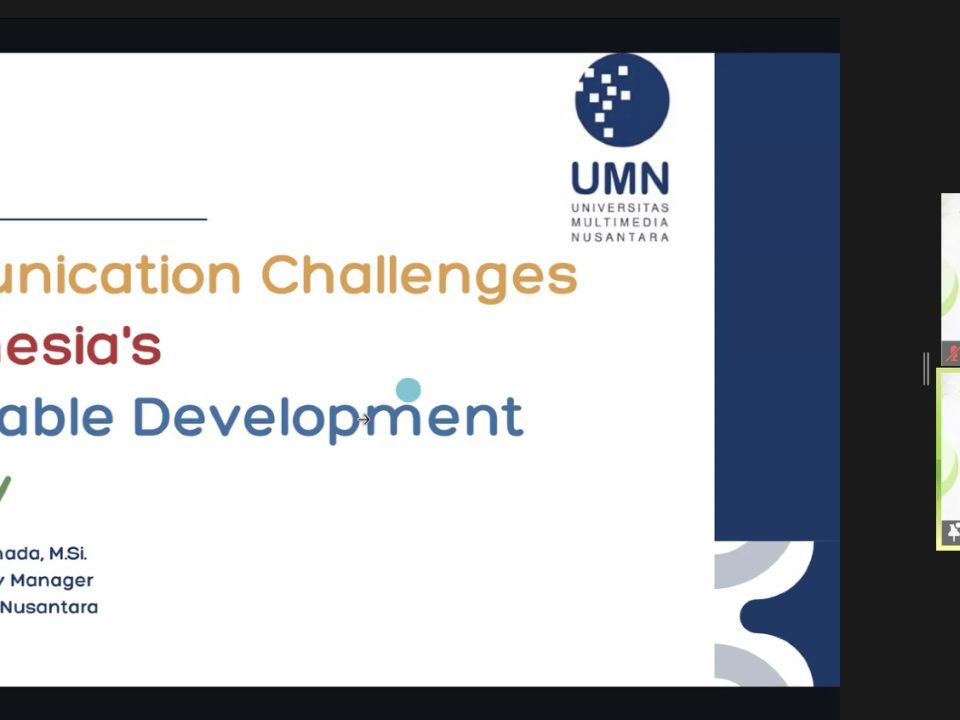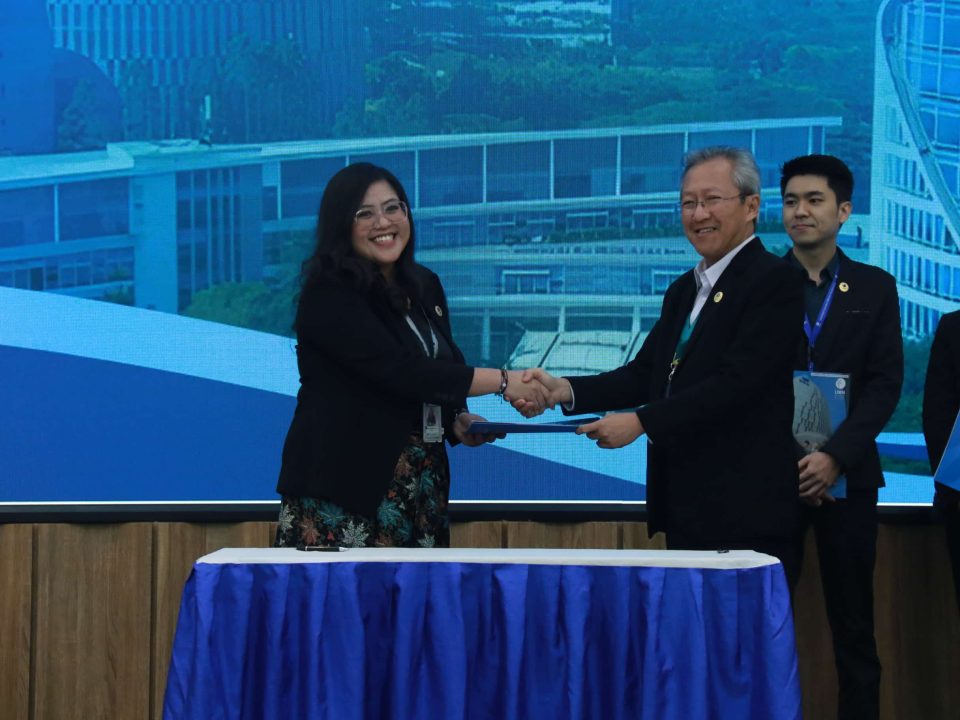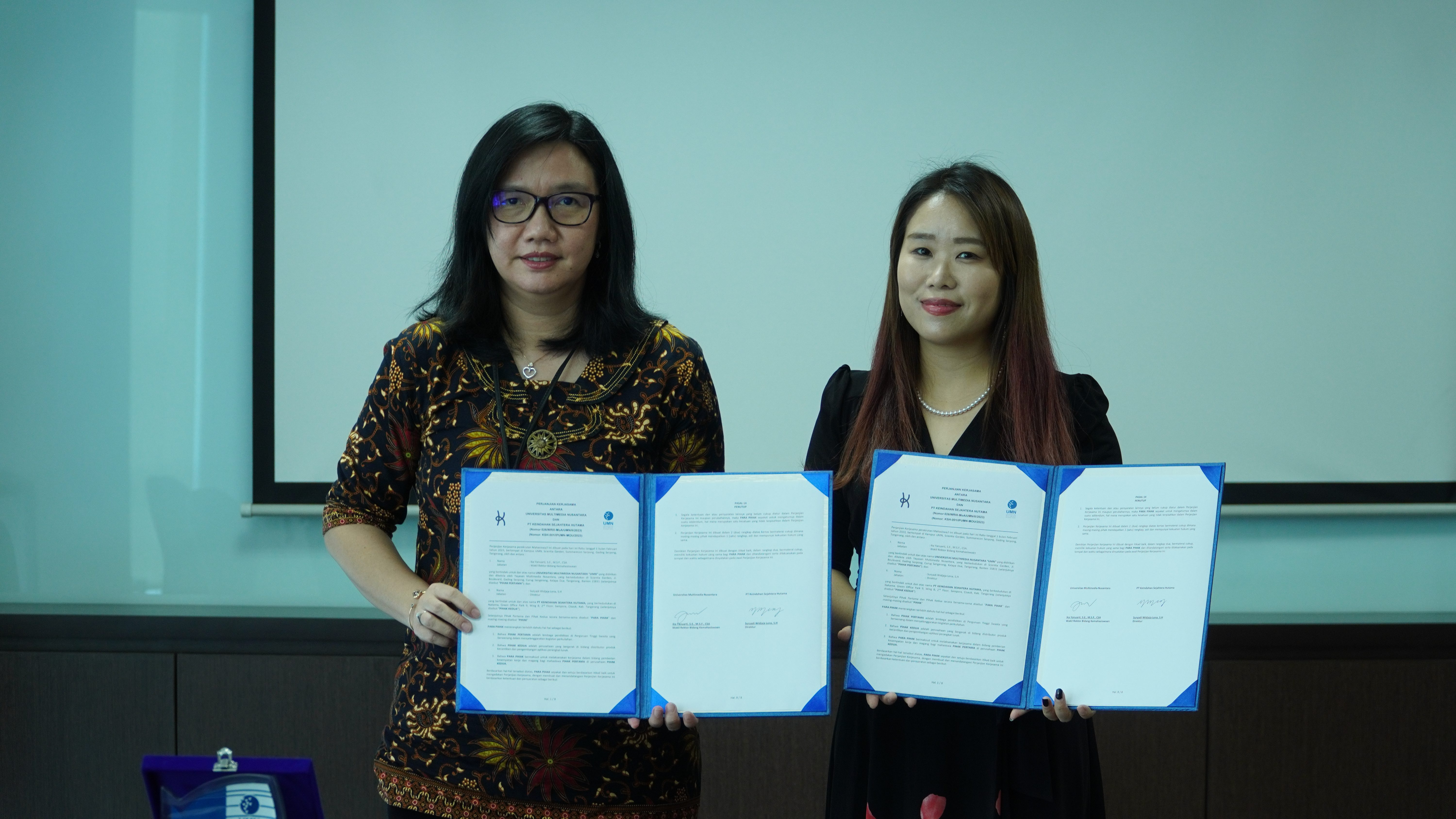
Cooperation between UMN CDC and K-Style Hub in Meeting HR Needs
May 9, 2023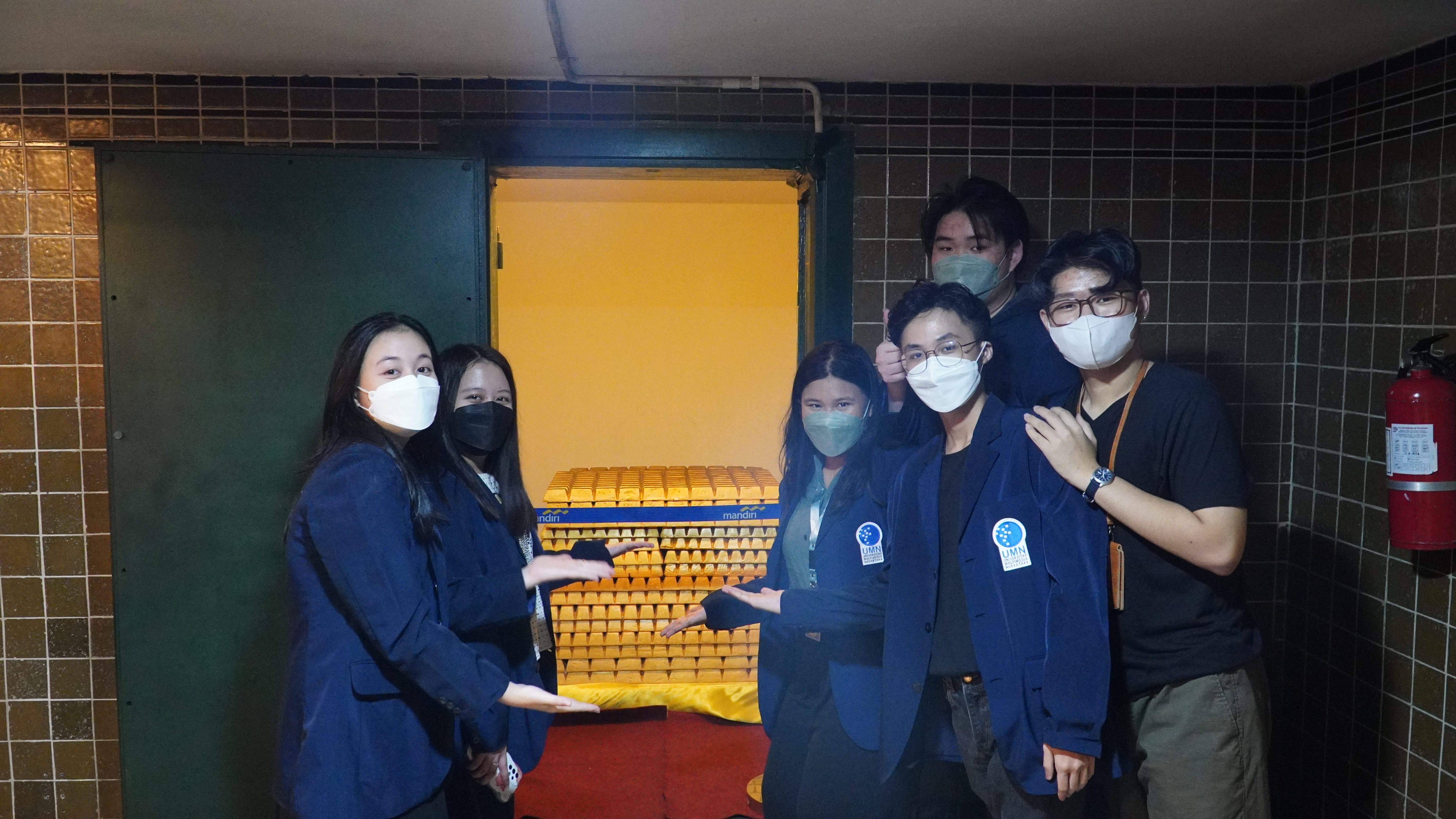
UMN Management Students Visits Mandiri Museum and The Indonesia Stock Exchange
May 15, 2023Guest lecture with Dr. Vasyl Ivanovich Hamianin, the Ukraine Ambassador to Indonesia. (Doc. Marketing Communications UMN)
TANGERANG – On Wednesday (03/05/23), Dr. Vasyl Ivanovich Hamianin, the Ukraine Ambassador to Indonesia, visited Multimedia Nusantara University (UMN) as a guest lecturer and discussed media relations during a crisis. In addition to the guest lecture, Vasyl also had a quick discussion with several UMN leaders, deans, and lecturers.
Before the guest lecture, Dr. Vasyl was welcomed by UMN Rector Dr. Ninok Leksono and fellow UMN leaders and staff. On that occasion, Ninok expressed his sympathy for the current conditions in Ukraine and hoped that things would improve. “We are delighted to have you here. Please accept our great sympathy for the people of Ukraine. We do hope that the conflict will end soon and have life return to normal,” Ninok said.
Vasyl also expressed his happiness in visiting UMN. He shared that he feels very close to Indonesian people. He has worked closely with many Indonesian media, including Kompas TV, Metro TV, Tempo, Liputan 6, etc.
Vasyl received his PhD in World History from the National Academy of Sciences in Ukraine. He eventually joined the diplomatic office of Ukraine in 2002. He was appointed as the Ambassador Extraordinary and Plenipotentiary of Ukraine to the Republic of Indonesia on the 31st of July 2021.
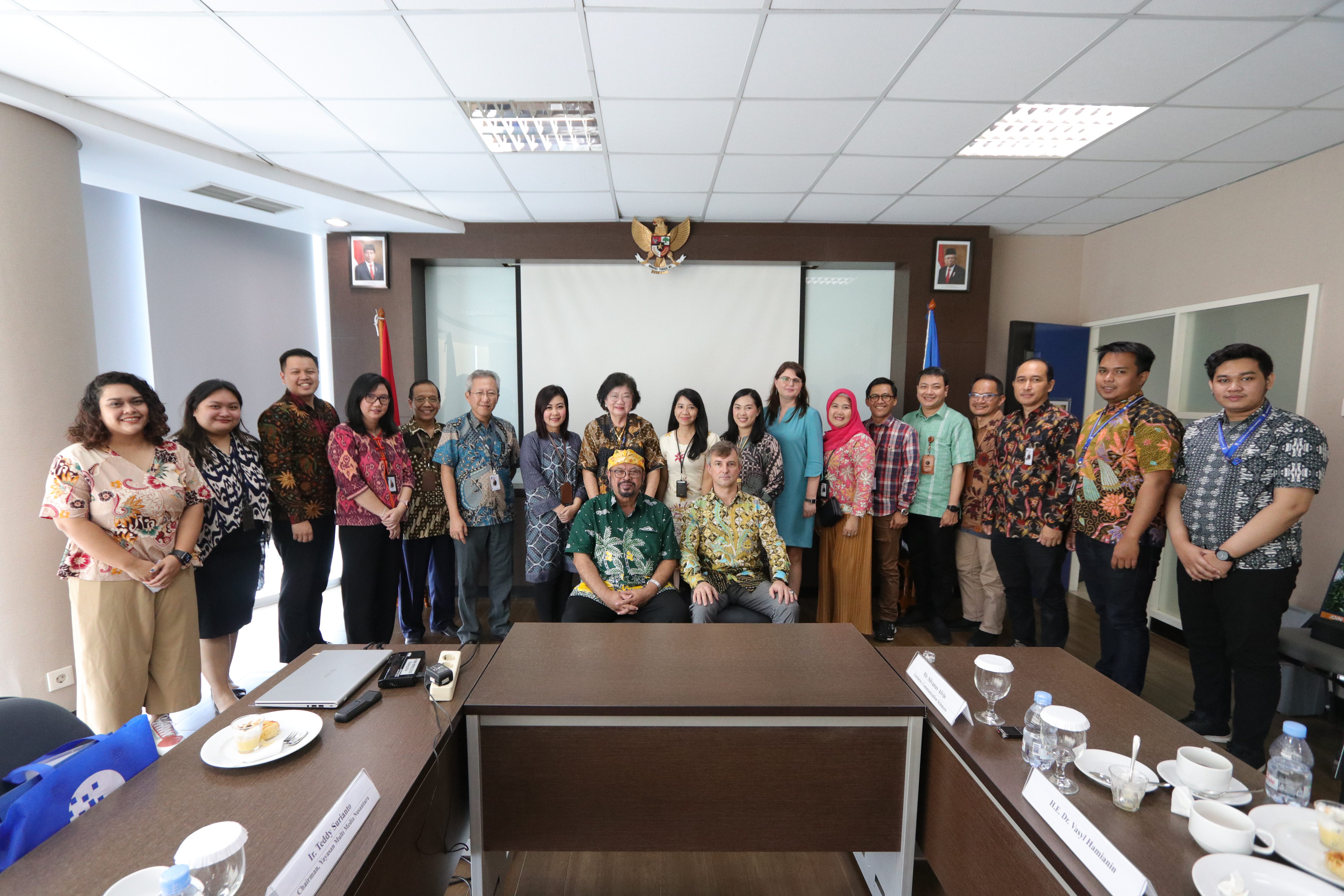
Dr. Vasyl Ivanovich Hamianin with several UMN leaders, deans, lecturers, and staff. (Doc. Marketing Communications UMN)
“I think we have pretty similar media in Ukraine and Indonesia– in character and nature,” Vasyl said. Like Indonesia, the Ukraine media is free and independent.
He also added that he wishes to have UMN collaborate with the embassy. The Ukraine Embassy to Indonesia has collaborated with several Indonesian universities conducting student and lecturer exchanges, humanitarian exchanges, joint projects, scholarships, and more.
“Of course, now it’s a difficult time for Ukraine, but universities are still very active and ready to cooperate,” Vasyl said.
After the short meeting between Vasyl and several UMN leaders, deans, and lecturers, Vasyl then conducted a guest lecture attended by UMN communication students and lecturers. He shared his experience as a diplomat dealing with media and providing case studies on the Russia-Ukraine war. Starting the presentation, he stated that the media should share interesting news that will attract attention.
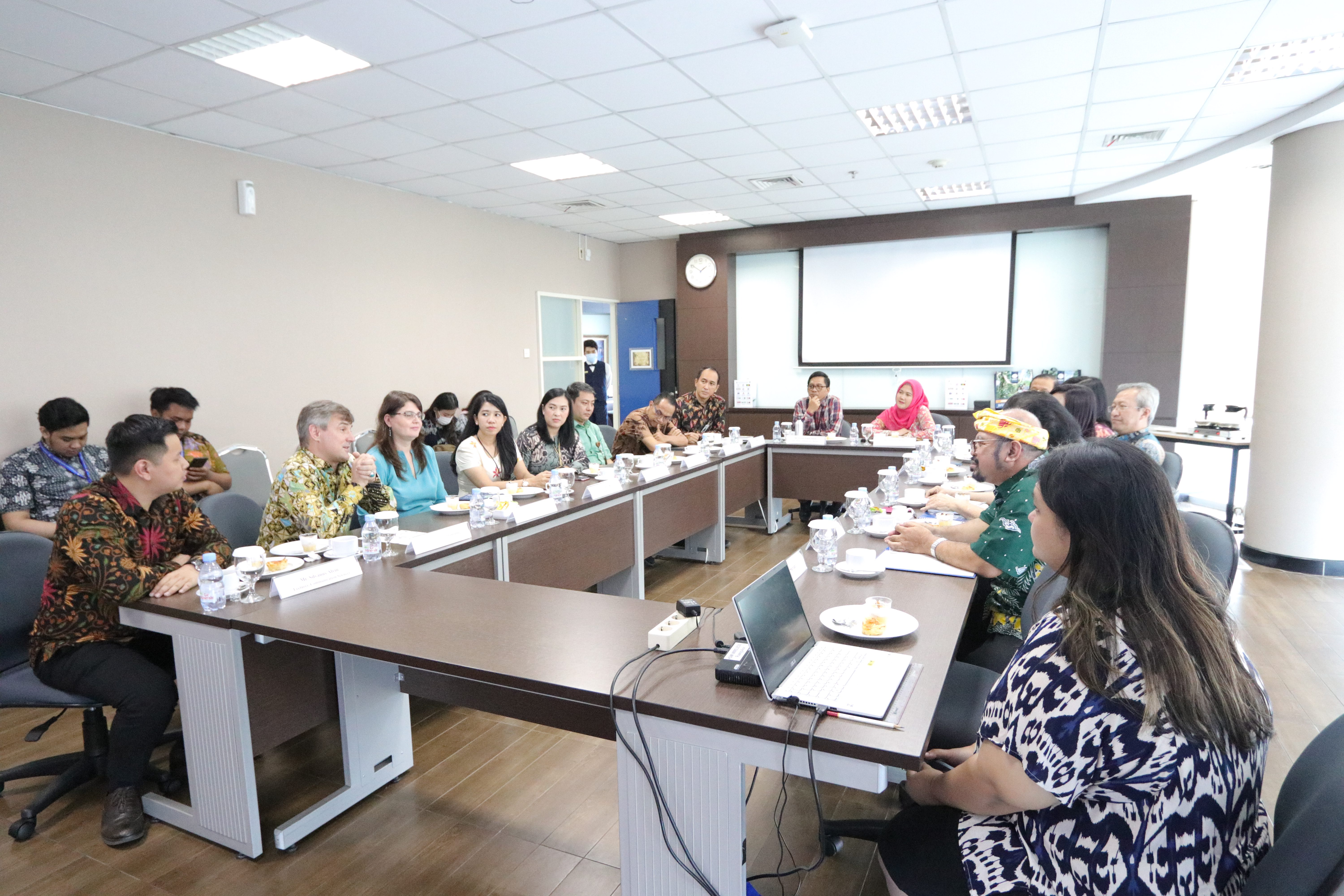
(Doc. Marketing Communications UMN)
Silvanus Alvin, S. I. Kom., M.A, the Coordinator Lecturer of the Media Relations Course, expressed his enthusiasm for this guest lecture.
“As the Coordinator Lecturer of the Media Relations Course, I really support UMN’s enthusiasm to go international. Therefore, in this guest lecture, we present the Ambassador of Ukraine to Indonesia, Dr. Vasyl, to share his perspectives and views on media relations studies and practices based on international perspectives,” Silvanus said.
This event can also serve as UMN’s momentum for sustainable internationalization. From this event, students are expected to be able to meet face to face, dialogue, and ask the Ambassador directly to absorb information and be able to utilize the information for their future career opportunities.
The Media Should Provide Balanced and Interesting News
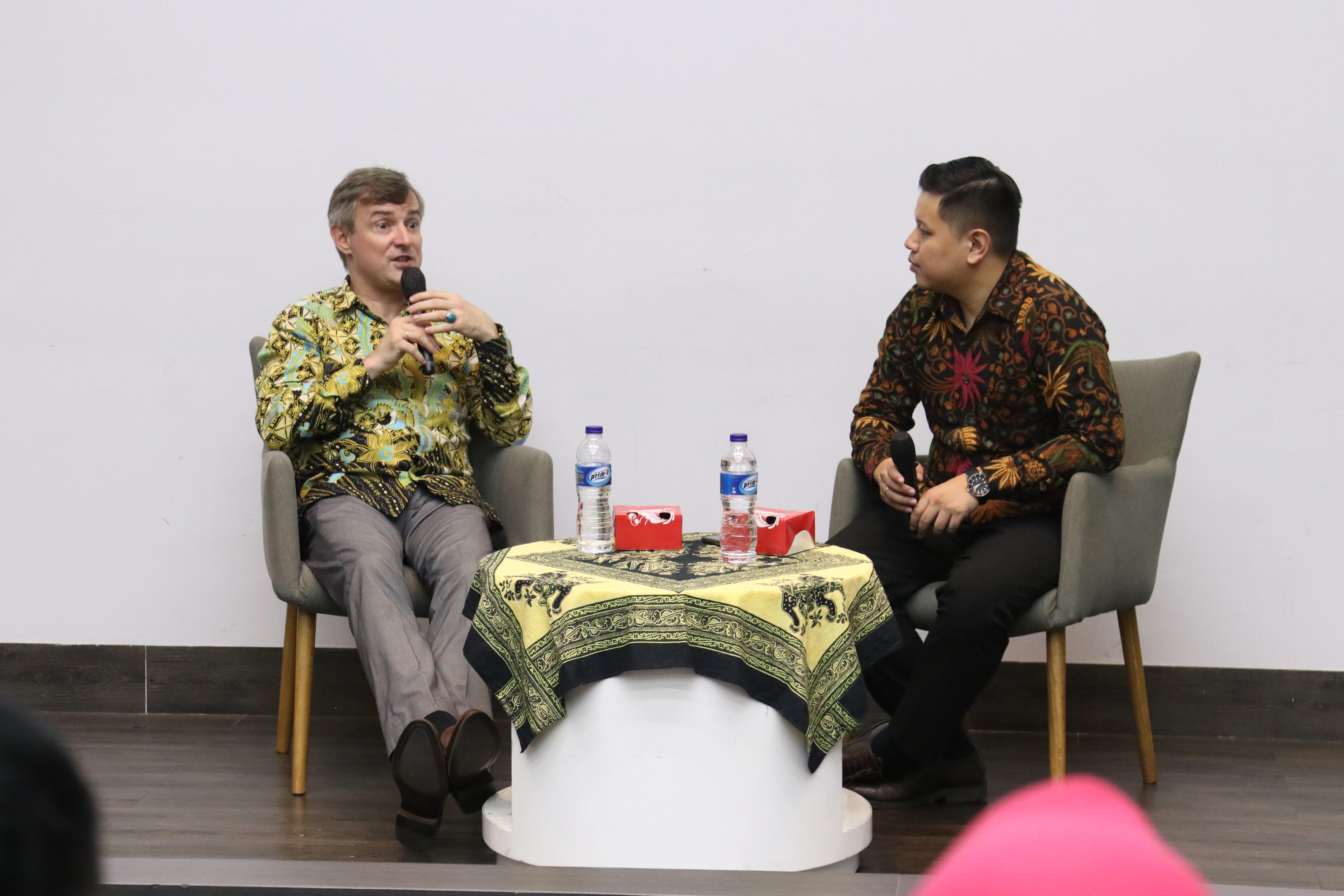
Media Relations During Crisis: An International Perspective. (Doc. Marketing Communication UMN)
In his presentation, Vasyl shared his experience as a diplomat dealing with the media and gave a case study on the Russia-Ukraine war. Starting his presentation, he said that the media should report something interesting and attention-grabbing.
“I mean, I post something important and get only 50 likes. But if I post that my cats and dogs are hiding under the bed and in the toilet to shelter themselves from the Russian Rudal, it attracts attention,” he shared.
Vasyl shared that some famous people were indifferent to what was happening in Ukraine. But as soon as there was news of animals suffering during the war, the news went viral, and people started donating millions of dollars to help.
The media, too, noticed this and started reporting on animal rescues in Ukraine to attract people to read and care about the issue. You may have seen viral videos and pictures of animals being rescued from being stuck and trapped for a long time inside the rubble.
He also emphasized balanced media. Balanced media is widely adopted in most media. But, if you look closely, there will be some media that position themselves in (prefers or supports more) one party.
When it comes to sensitive issues like war that cause destruction and death of many people, it’s not easy or even possible to be neutral. Many have said that if you act neutral in a situation of injustice, you have chosen to side with the oppressor.
Vasyl shared that Tempo’s “Ura, Genosida?” report is a good example when reporting war crimes. Tempo is one of the many Indonesian media that came to Ukraine and documented the war. Their report showcased the damaged houses and the situation in Ukraine.
In the same report, Tempo also provided a page of an interview with the Russian Ambassador for Indonesia, showing her thoughts about the aftermath of the Russian invasion in Ukraine.
It’s not solely about siding with Ukraine, but doing what Tempo did can help force accountability and detect any lies or inconsistencies from one or even both parties. Regardless, the media should always focus on empowering and helping the people impacted by the problem.
“I want to thank those media from Indonesia who visited Ukraine in our terrible times. There are a few groups of journalists from Tempo, Kompas TV, Metro TV, ad more. They were reporting from the frontline, from the trenches about 100 meters from the enemy, under the explosions and everything. Thank God they are all alive and returned to Indonesia safely,” Vasyl said. He also thanked and respected the journalists who were murdered during the invasion.
Media Relations During a Crisis: Countering Propaganda and Disinformation, Especially on Social Media
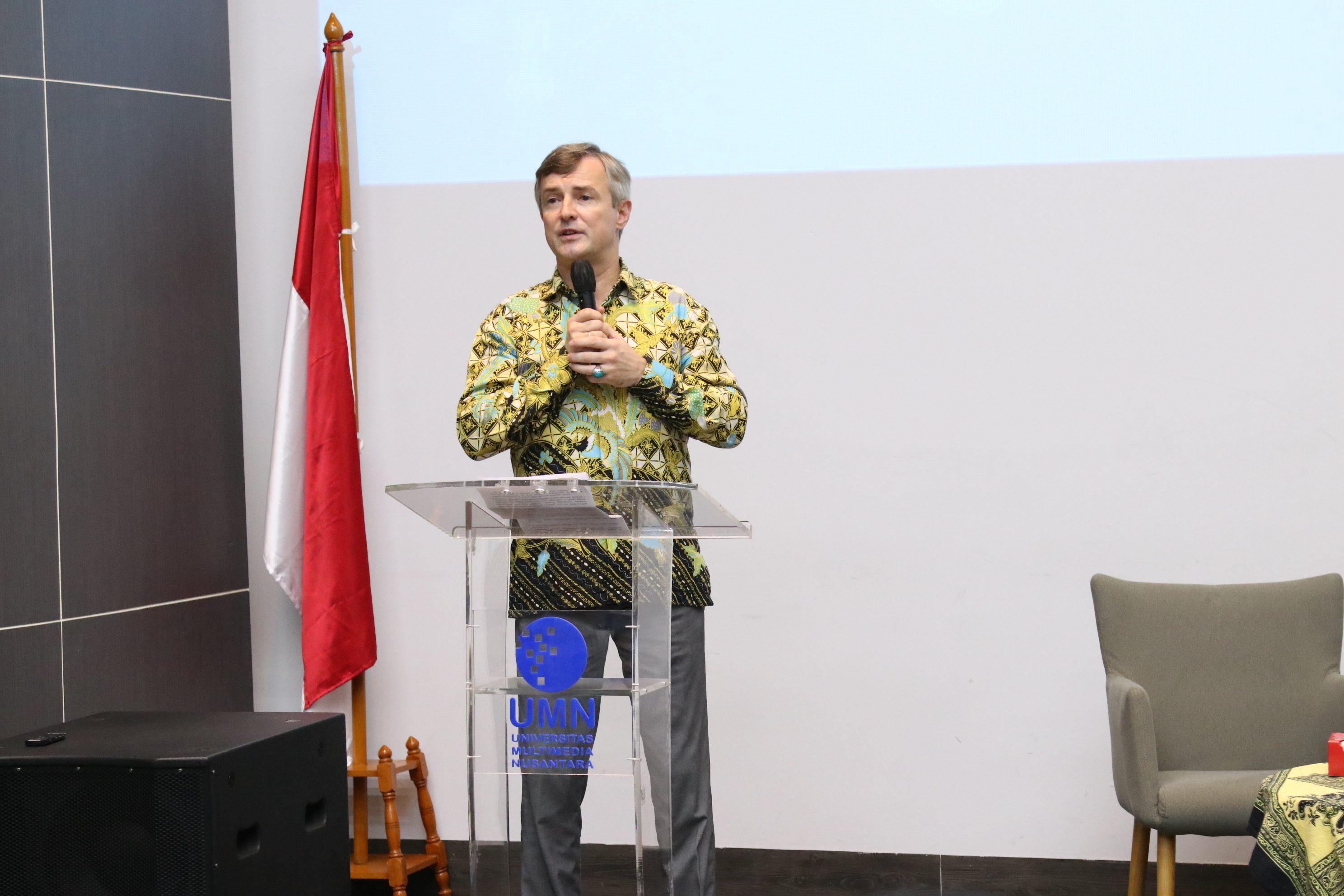
Dr. Vasyl Ivanovich Hamianin shares the importance of people in media relations and journalism in difficult times like war. (Doc. Marketing Communications UMN)
Vasyl then shared his task in terms of media and communications. His job is to counter the disinformation and propaganda spread about Ukraine.
“Propaganda is always clear and simple. Propaganda always looks very much reliable. Propaganda looks better than the truth, as the truth is ugly,” Vasyl emphasized.
Propaganda and war always go hand in hand. The main aim of propaganda is to demoralize the enemy or make the enemy look bad and evil. Quoting the British Library, subsequent modern wars required propaganda to mobilize hatred against the enemy, convince the population of the justness of the cause, enlist the active support and cooperation of neutral countries, and strengthen the support of allies and the public.
Of course, disinformation comes with propaganda– and with social media, those propagandas and disinformation flood the internet. Vasyl mentioned how many influencers share false and fake information about the Russia-Ukraine war, specifically on TikTok.
“The one who wins TikTok wins the world,” Vasyl said while laughing. The government must consider this and conduct social media monitoring to monitor and track propaganda and disinformation. This takes plenty of time and money.
From the media side (journalists), it’s crucial to always filter and verify the information before spreading them, and even help debunk any misinformation online. Vasyl also added that the media needs to be strong, aggressive, and creative.
“Aggressive in terms of active (not being mean or rude). Evil is always with teeth, claws, aggressive, and ready to kill. If democracy doesn’t grow teeth, claws, and weapons, it will lose defending humanity, democracy, and human rights,” Vasyl said.
From what he said, it can be concluded that the media is no longer just a medium for information (passive). The media has the power to influence, empower, entertain, educate people, and make changes in the world.
In difficult times like war, the media has the power to educate people and de-escalate problems by providing a voice for those who are advocating for peace, solution, and negotiation. At the same time, if done wrong, the media can act as a catalyst and even initiate new problems.
“In today’s digital era, the role of public relations is very important in dealing with hoaxes,” said Silvanus.
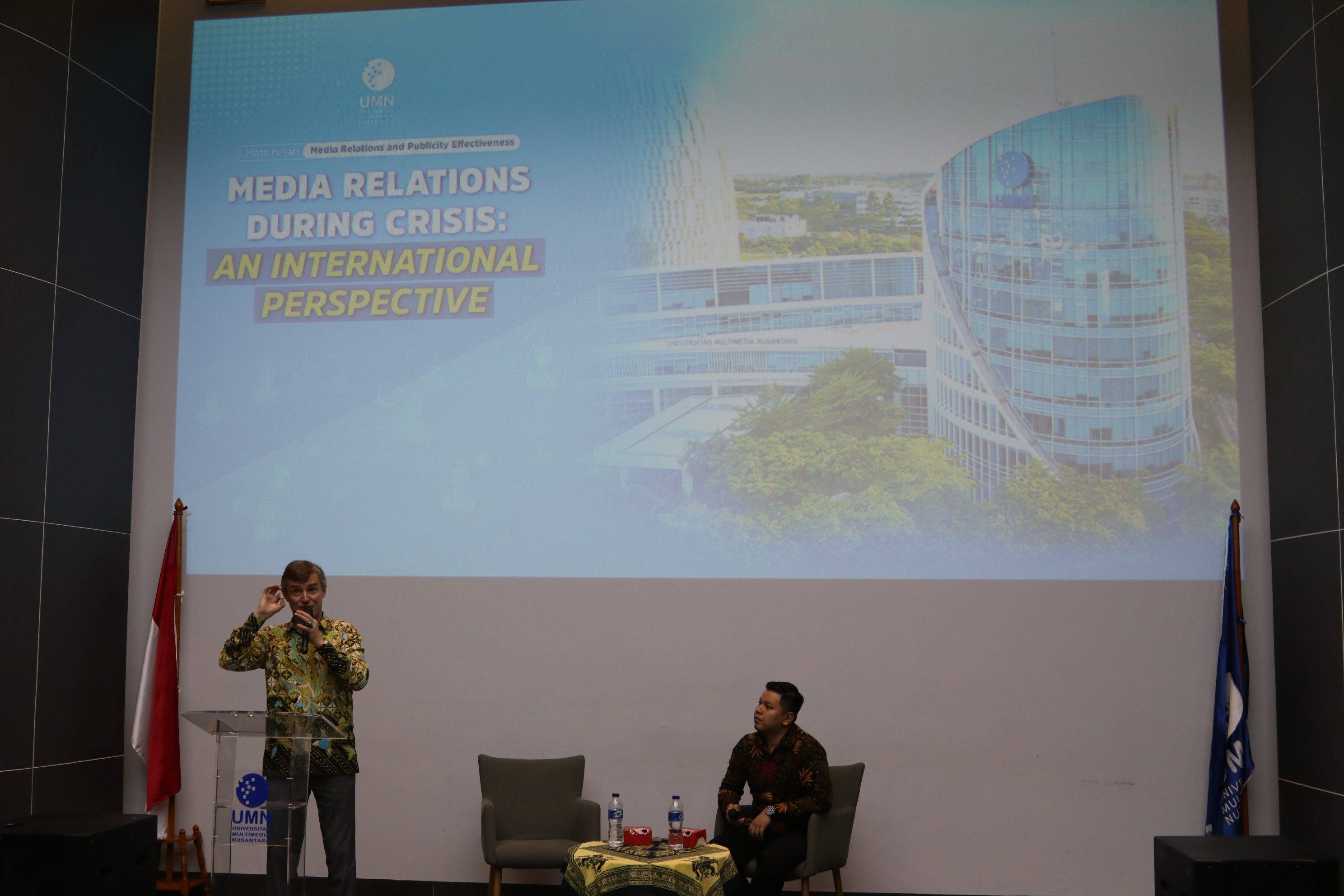
(Doc. Marketing Communications UMN)
Vasyl also sent a message to all UMN Communication Science students. “You are the future of this country. You are the future of this media and social media world and this society in general,” Vasyl said to UMN students in his closing statement.
As of the time of writing (08/05/23), after more than a year since the Russian invasion of Ukraine on the 24th of February 2022, the Russia-Ukraine war is still ongoing, impacting thousands of citizens and animals. We sympathize, and our hearts and minds are with all the victims of the Russia-Ukraine war. We hope that world leaders can come together and find true peace.
By Levina Chrestella Theodora
English translation by Levina Chrestella Theodora
Kuliah di Jakarta untuk jurusan program studi Informatika| Sistem Informasi | Teknik Komputer | Teknik Elektro | Teknik Fisika | Akuntansi | Manajemen| Komunikasi Strategis | Jurnalistik | Desain Komunikasi Visual | Film dan Animasi | Arsitektur | D3 Perhotelan , di Universitas Multimedia Nusantara. www.umn.ac.id

